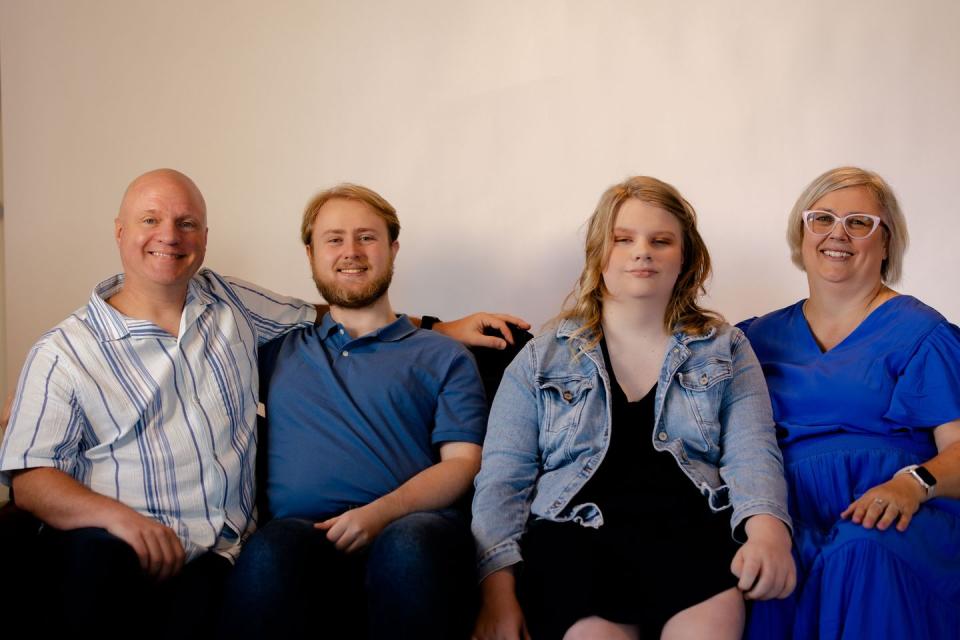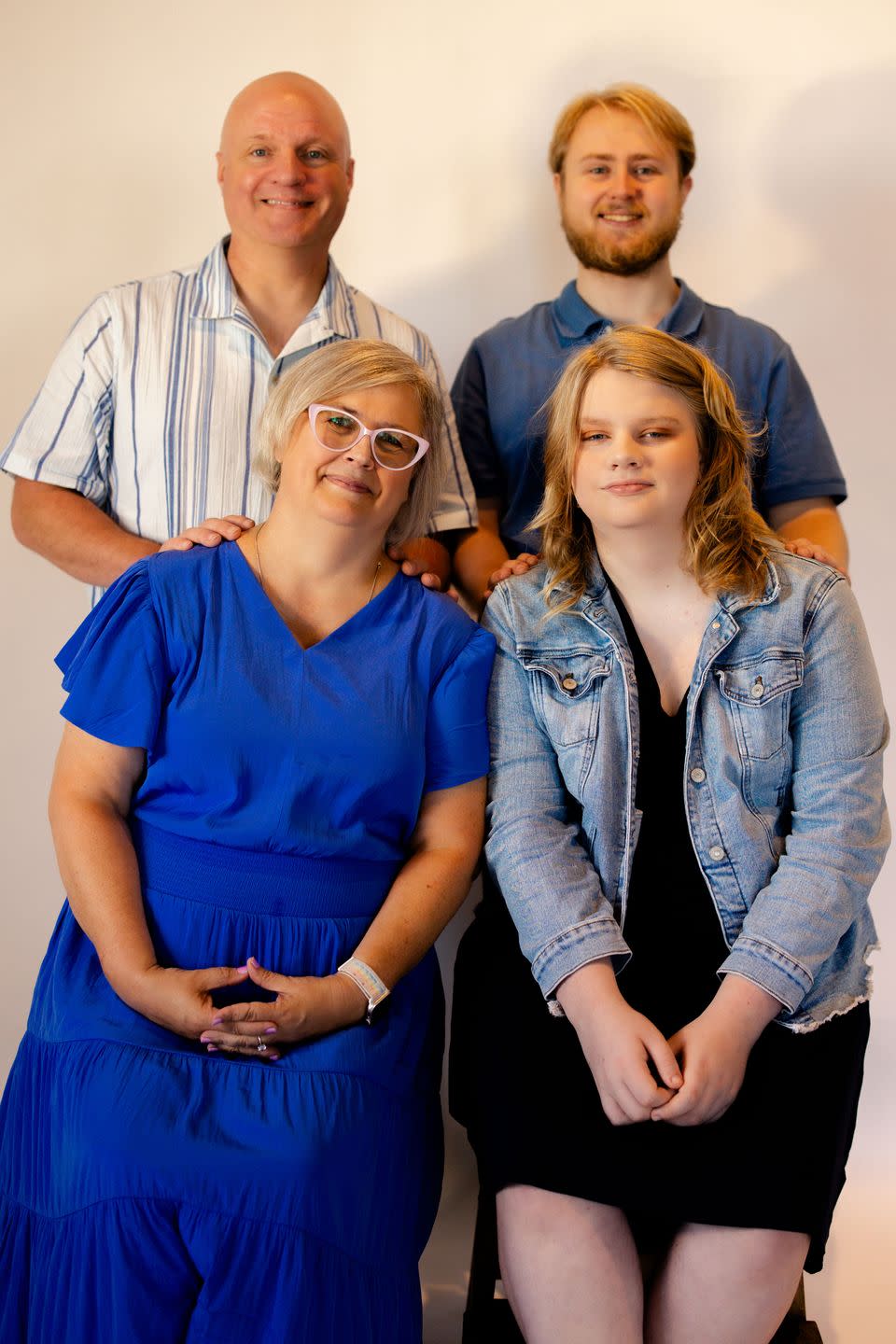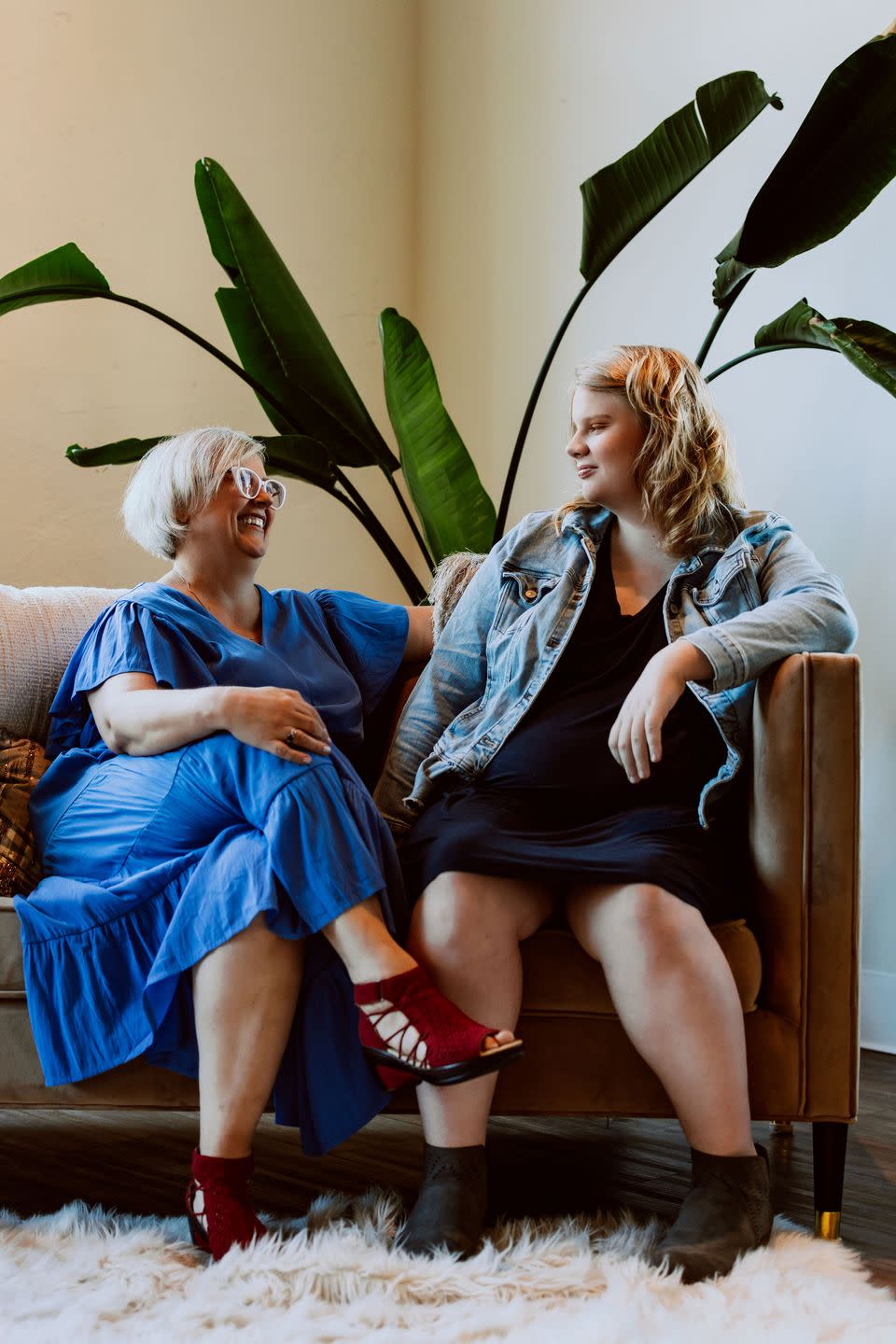Nora, a Trans Teenager, Was Forced to Flee Her Home State. Where Does She Go From Here?


Nora Anderson has left a lot of places. When administrators forgot to unlock the only unisex bathroom at her high school in Iowa City, Iowa, the transgender 15-year-old (who felt uncomfortable using the girls’ restroom) got picked up by her parents so she could use one at home or a nearby grocery store. After a classmate suggested starting an “anti-trans club,” she transferred out of the public school system and switched to homeschooling. Nora couldn’t even get a German pastry at the farmers market without a blonde middle-aged woman shouting, “Look! There’s a boy in a dress!” She left without buying anything. Then, in 2022, the governor of Iowa, Kim Reynolds, aired a campaign ad saying, “We still know right from wrong, boys from girls.” Nora and her family no longer felt welcome—or safe—in their home state. So they packed up and moved to Portland, Oregon. “It’s pretty sad having to leave all the time,” Nora says with a sigh.
Refugees flee war, violence, conflict, and persecution. They are displaced families who have lost their homes in battle. They are environmental migrants forced to escape famine due to historic droughts. They are not, as we traditionally think of them, American families driving SUVs cross-country. Though the Andersons didn’t flash their passports at the border or submit to questioning by immigration officers, leaving Iowa meant they joined a growing group of so-called gender refugees escaping states that have become increasingly hostile for the transgender community.

The extreme proliferation of anti-trans laws in states over the last two years is forcing families like the Andersons to consider leaving the places they love in order to get their loved ones the care they need. In Portland, many don’t know Nora’s “deadname,” a term that some transgender people use to refer to a birth name they no longer use. There is no anti-trans club at school. And she eats her pastries in peace. For the Andersons, leaving was not a sign of defeat, but a lesson in choosing to live as your most authentic self. “I just wanted Nora to know that if she’s in a relationship where she’s being treated poorly or badly, she shouldn’t stay,” Nora’s mom, Cindy Anderson, says. “We had to sacrifice a lot, but I don’t see us ever going back.”

The Andersons are a typical family from the Midwest. Cindy and Mike Anderson met as students at Winona State University in Minnesota. They got married in 1993, and moved to Iowa City 10 years later to start a family. Cindy, a child psychologist, and Mike, a software engineer, bought and completed renovation work on an idyllic farmhouse set on five acres of land, with a fenced-in side yard for their goldendoodle Sunshine to run around in. In the garden, they grew tomatoes, kale, corn, and cucumbers. Their kids, Nora and her older brother Sam, took piano, soccer, and swim lessons. Weekend outings included visits to state parks and the local children’s museum. They loved taking the dog outside and going on long bike rides. “Everything was good,” Nora says. “Iowa was just a really nice place, with nice people, and everyone was so friendly.”
Everyone doted on Nora from the moment she came home from the hospital in 2007. But no one adored her more than Sam. They played Legos together and swam in the community pool. Every morning, they rode their bikes to school together. After class, Sam made a point of including her in his plans. He was protective of Nora, who is shy by nature. “I remember Sam introducing her saying, ‘This is my brother, a man of few words,’ and everyone would laugh,” Cindy says. “He was always there to make sure she knew she was important, even if she didn’t talk a lot.”
When Nora started fourth grade in 2016, her family noticed that she was being quieter than usual. Cindy and Mike, who was on bereavement leave following the death of his stepfather from cancer, made the financial decision to transfer Nora from private to public school. “We thought she was just sad because of all the changes,” Cindy says. Doctors prescribed Nora antidepressants to cope with the transition. But looking back now, Nora knows it wasn’t the swirl of change around her causing the dejection—it was the changes within her. “I was just really confused,” she says.
In middle school, Nora began feeling anxious and sad all the time. She found comfort in an unlikely place: some 270 years in the future. Losing herself in Fallout 4, a postapocalyptic role-playing video game set in the year 2287, was “like an escape and a way to find myself,” she says. “When I played a female character, it really connected with me.” Fallout 4, which Nora had been playing since she was nine, helped her come to terms with what she had started to suspect: that her sex assigned at birth and gender didn’t align.
When she was 13, Nora told her mother that she was a girl. Cindy had completed LGBTQ+ workshops as part of her work as a child therapist, but now she would have to incorporate that knowledge at home. “Never once in a million years did I suspect that she was transgender,” Cindy says. Over the next year, Nora wondered whether she might be gay, not transgender. “The thing that I regret most in my life was [thinking] I was just gay,” Nora says. “I could’ve come out [as trans] and started getting treatment sooner.”
By the time she started high school in 2021, Nora knew for sure. She started to identify as transgender and was prescribed a puberty-blocking implant and an estrogen patch. Nora asked friends and family to refer to her by her middle initial, “J,” before settling on “Nora,” her favorite character from Fallout 4.
When she finished her freshman year in 2022, Nora was living entirely authentically, and had never felt more herself—but real life can’t always be controlled like a video game. As she struggled with all the work it takes to feel comfortable in your own skin, Nora was also battling severe depression. At school, she “did not feel comfortable using the girls’ restroom,” says Cindy, adding that a counselor told her daughter that she could “use the gender neutral bathroom.” However, that bathroom was difficult to access because it was usually locked. Nora attended a few weeks of school sophomore year, before her classmates’ stares made her so self-conscious that she began homeschooling online. Just like in middle school, Nora used video games as a way to cope.
When she was feeling down, Nora and her mom went shopping at thrift stores for affirming clothing. To this day, her favorite find is a gray shirt with a pride flag and the slogan “Protect Trans Youth,” which Cindy picked up for Nora after she came out.
As Nora learned to embrace her new self, some politicians in her home state were looking to codify gender as binary. Ahead of the November 2022 midterm elections, Governor Reynolds, who was up for reelection, took aim at “woke” people in a television ad with anti-trans overtures, saying Iowans still know “boys from girls.” Given the state’s controversial law prohibiting transgender women and girls from playing school sports that match their gender identity, the Andersons saw it as a call to action. “I can’t raise this child to be a happy adult when she’s scared every hour,” Cindy says of Nora.
Reynolds was leading the polls by a large margin, and in the months leading up to the midterms, Cindy worried about her daughter’s future access to prescriptions for puberty blockers and hormone therapy. During a follow-up appointment in June 2022, Nora’s doctors suggested looking for care in other states in anticipation of Reynold’s reelection and her campaign promise to make this treatment illegal. “All these things to help her transition in a way where she’s not depressed or suicidal—and then, overnight, it’s all gone,” Cindy says. “It was like a death sentence.”

It all became too much. The offensive comments in line at the farmers market. The older man who flipped her the bird at the grocery store. The locked bathroom. The threat of an anti-trans club at school. The uncomfortable looks from her teachers, classmates, and neighbors. The Andersons sought to insulate their daughter from the cruelty directed at her. But the isolation that required was no way to raise a teenager, especially one battling depression.
The Andersons felt they had run out of reasons to stay. Leaving Iowa began to feel like the only option for Nora to continue receiving her medical care. The Andersons considered moving back to the Minneapolis–Saint Paul metropolitan area, which they knew to be LGBTQ+ friendly, but eventually picked Portland, where Cindy’s cousin and Mike’s brother both live. Oregon is consistently ranked as one of the friendliest LGBTQ+ states in the country, and the Portland Public Schools district is widely considered one of the safest in the country for transgender children.

In October 2022, one month before the midterms, Nora and Cindy loaded Sunshine into the family’s red Volkswagen van and set out on a road trip to Portland, where they rented an Airbnb until they could find a more permanent arrangement. The plan was for Mike to join them after selling the farmhouse. Sam, then a junior at the University of Iowa, stayed behind to finish his degree. “It was brutal,” Sam says. “I’m frankly mad at the state.”
The 30-hour drive was bittersweet. “We had to give up meaningful friends, established support systems, and our sense of community,” Cindy says. But the Andersons never looked back. Five months after their move, Iowa’s governor signed a bill into law that prevents health care professionals from giving medical treatment “for the purpose of attempting to alter the appearance of, or affirm the minor’s perception of, the minor’s gender or sex, if that appearance or perception is inconsistent with the minor’s sex [at birth].”
If they had stayed, Nora would no longer have been able to access care. The Andersons know that leaving was ultimately the right choice, though they recognize it’s a choice that not every family has the ability or the resources to make. “We are real human beings who have suffered, but I am forever very aware of our privilege,” Cindy says. “Most people can’t move, and we owe it to them to try to help them.”

All over the country, lawmakers are coming between transgender people and the care they need. More than 570 anti-LGBTQ+ bills were introduced in state legislatures in 2023, and over 125 of these bills specifically targeted transgender young people, according to the Human Rights Campaign, the nation’s largest LGBTQ+ civil rights organization. Although many of these bills have not passed, the unprecedented push by politicians to shift the legal landscape for trans youth has become, alongside abortion, a major issue in recent legislative sessions, even prompting the HRC to declare a state of emergency.
Of the nearly 300,000 trans youth ages 13 to 17 residing in the U.S., nearly a third of them live in a state that now restricts their access to sports, school bathrooms, or gender-affirming medical care, according to a 2023 study by the Williams Institute at the UCLA School of Law, a research organization that studies sexual orientation and gender identity law and public policy. As defined by the World Health Organization, gender-affirming care encompasses a wide range of social, psychological, behavioral, and medical care for people of all ages and is “designed to support and affirm an individual’s gender identity” when it conflicts with the sex they were assigned at birth. This kind of care can include counseling, social and legal interventions, speech therapy, medical procedures, and hormone therapies like puberty blockers.
Transgender and nonbinary youth have higher rates of mental health issues when compared to cisgender youth, most often due to lack of acceptance and affirmation. Nearly all professional medical associations, including the American Medical Association, consider gender-affirming care medically necessary, and in some cases even life-saving. Multiple studies have found that providing gender-affirming care can prevent cases of eating disorders, substance abuse, and suicidal ideation. At the same time, denying access to gender-affirming care can lead to mental distress.
Twenty-three states have banned gender-affirming care for transgender people under the age of 18 (at press time, care was still accessible in four of these states, while appeals move through the courts). Two of these states (Texas and Oklahoma), along with South Carolina, are considering banning gender-affirming care for transgender people up to age 26. As these laws continue to be challenged in court, transgender people and their families are fleeing to states like Oregon and Connecticut, which have shield laws and executive orders that protect people’s access to gender-affirming health care. “I’m confident that over time, more and more Americans are going to come to support their transgender neighbors,” says Rodrigo Heng-Lehtinen, executive director of the National Center for Transgender Equality. “But is that going to take five years? Or is it going to take 20 years? In the meantime, lives are at stake.”

According to a June 2023 polling report by the think tank Data For Progress, 8 percent of transgender adults have moved out of communities or states because of the uptick in anti-trans legislation, and another 43 percent have considered doing so. GoFundMe data provided to ELLE found a 520 percent increase from May 2022 to May 2023 in fundraisers helping transgender residents looking to relocate from the state of Florida, which has enacted six anti-LGBTQ+ bills into law in 2023, including bans on gender-affirming care.
After the Texas Department of Family and Protective Services announced in February 2022 that it would begin investigating any reported instances of transgender children receiving gender-affirming health care, which Governor Greg Abbott deemed “child abuse” in a letter to DFPS, Kimberly Shappley began to fear what would happen to her own 11-year-old transgender daughter, Kai, who went viral for protesting anti-trans legislation in Texas when she was just 10 years old. “I just kept thinking that if they take our kids, no matter how mad people are, nobody is going to be able to come help us,” Shappley says. “And if they [did] come for our kids, do I have the money that it would take to fight this in court?”
In August 2022, the family sold their home in Austin and moved to Connecticut. Kai feels much safer, but the adjustment hasn’t been easy. “We’re homesick,” Shappley says through tears. “We didn’t leave Texas because I had some great job offer. We didn’t leave Texas because we had family we wanted to be closer to. We fled the government of Texas. We are refugees in our own country.”

In Portland, there’s no shortage of lawn signs declaring support for trans kids. When Cindy called a neighborhood salon to ask if they do haircuts for trans kids, the receptionist responded: “Of course.” At Nora’s ear piercing appointment, the piercer asked for her pronouns. And the family’s church has a trans support group that meets twice a month. The Andersons believe their new community makes an extra effort to be kind, because they sympathize with how politicized Nora’s identity has become. “We [can] finally breathe again,” Cindy says.
Nora misses her friends back in Iowa City, but her new home feels, well, more like home. She has a team of doctors to help affirm her gender, including a primary care physician, an endocrinologist, and a psychiatrist. Her teachers and peers always use her correct name and pronouns. And she always has access to the bathroom. “It’s like a weight has been lifted off my shoulders,” Nora says.
Mike has since sold the family’s Iowa farmhouse and joined Nora and Cindy in Portland. He and Cindy had been working remotely, going back to Iowa City on business trips and to visit Sam while he was still in college, but the “Welcome to Iowa” announcement that plays on repeat at the Eastern Iowa Airport no longer felt as friendly as it used to. “It angered me every time, because I know my family is not welcome there,” Mike says. Cindy adds, “It’s juxtaposed with the great pain and rejection of my family not being welcome unless we hide who we are.”

This story is part of ELLE’s Affirmed series helmed by guest editor Tommy Dorfman that explores gender-affirming care in all its many forms. All stories were done with support from GLAAD, and all illustrations were done by Anshika Khullar, an Indian, nonbinary transgender artist.
You Might Also Like

